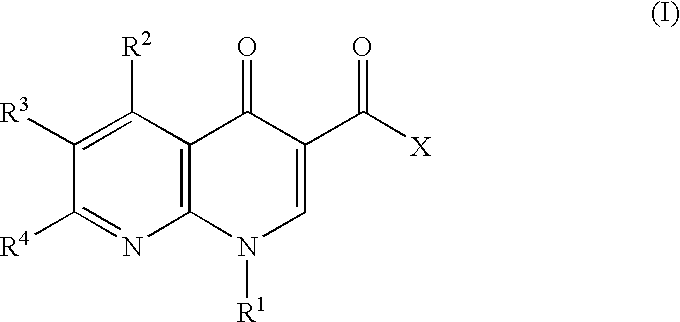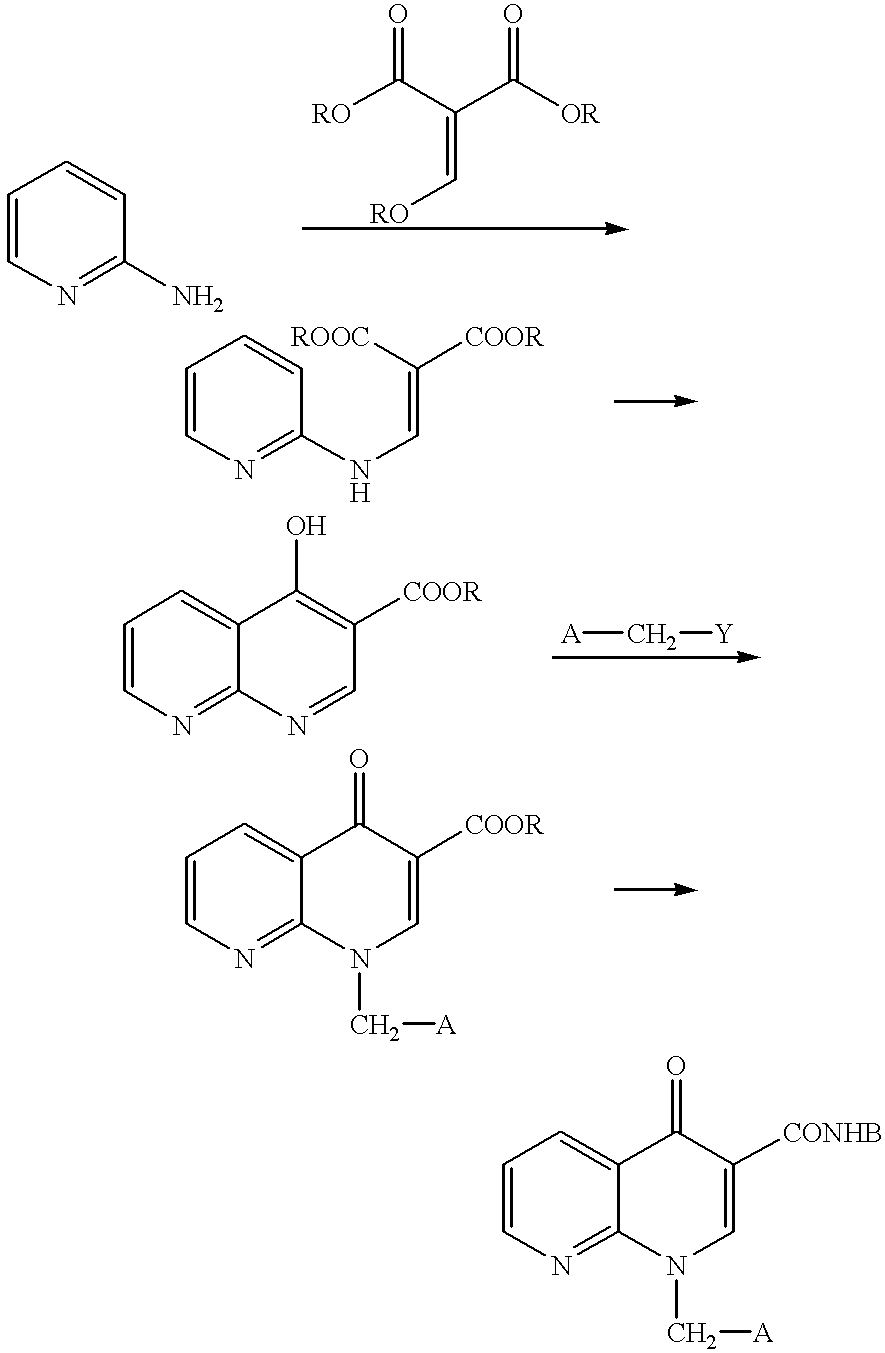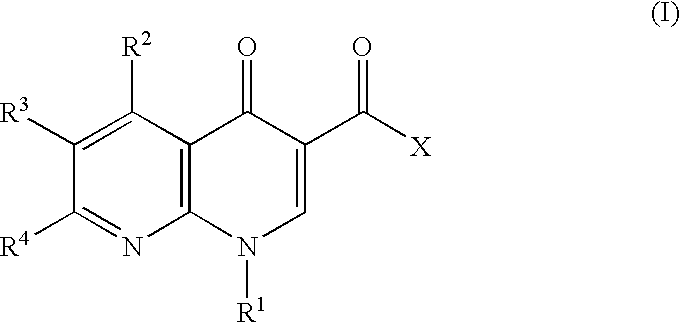1-aryl-1,8-naphthylidin-4-one derivative as type IV phosphodiesterase inhibitor
a technology of phosphodiesterase inhibitor and 8-naphthylidin, which is applied in the direction of heterocyclic compound active ingredients, biocide, drug compositions, etc., can solve the problems of no drug which has this enzyme inhibiting action, no satisfactory medicine, and limited substitution groups which can be introduced to the 1-position
- Summary
- Abstract
- Description
- Claims
- Application Information
AI Technical Summary
Benefits of technology
Problems solved by technology
Method used
Image
Examples
example 1
Synthesis of Ethyl 3-(4-Fluoroanilino)-2-(2-chloronicotinoyl)acrylate
A mixed solution of ethyl 2-chloronicotinoyl acetate (410 mg, 1.8 mmol) in triethylformate (449 .mu.l, 2.7 mmol) and acetic anhydride (2.04 ml, 21.6 mmol) was heated and stirred at 130.degree. C. for 1 hour. The solution was cooled, then the solvent was distilled off under vacuum to obtain an oily substance. This oily substance was dissolved in methylene chloride (7 ml), 4-fluoroaniline (188 .mu.l, 1.98 mmol) was added at room temperature, and the solution was stirred at that temperature for 1.5 hours. Next, the solvent was distilled off under vacuum and the residue, was purificated by silica gel column chromatography (hexane / ethyl acetate=2 / 1) to obtain the above-identified compound (510 mg, 81%) as a slightly yellow crystal.
MS(FAB) 348[M+1].sup.+. 1H-NMR(CDCl.sub.3): .delta. 0.97(3H, t, J=7.1 Hz) 4.03(2H, q, J=7.1 Hz) 7.10-7.18(2H, m) 7.23-7.32(3H, m) 7.56-7.63(1H, m) 8.37-8.42(1H, m) 8.59(1H, d J=13.6 Hz) 12.65-...
example 2
Synthesis of Ethyl 1-(4-Fluorophenyl)-1,4-dihydro[1,8]naphthylidin-4-one-3-carboxylate
Sodium hydride (abt. 60% oil suspension 429 mg, 10.7 mmol) was added to a tetrahydrofuran (45 ml) solution of ethyl 3-(4-fluoroaniline)-2-(2-chloronicotinoyl) acrylate (3.56 g, 10.2 mmol) at 0.degree. C. and the solution was stirred at that temperature for 5 minutes. It was further stirred at room temperature for 1 hour, then water (100 ml) was added and extraction was performed with ethyl acetate (200 ml). Next, the organic layer was washed with saturated saline (50 ml), then dried over anhydrous sodium sulfate, then the solvent was distilled off under vacuum. The precipitated crystal was washed with diethyl ether and the crystal was obtained by filtration to obtain the above-identified compound (2.84 g, 89%) as a colorless crystal.
IR(KBr)cm.sup.-1 : 2982, 1690, 1649, 1511. MS(FAB) 313[M+1].sup.+. 1H-NMR(CDCl.sub.3): .delta. 1.41(3H, t, J=7.1 Hz) 4.41(2H, q, J=7.1 Hz) 7.23-7.41(2H, m) 7.48-7.56 (3...
example 3
Synthesis of 1-(4-Fluorophenyl)-1,4-dihydro[1,8]naphthylidin-4-one-3-carboxylic Acid
1N sodium hydroxide solution (5.3 ml, 5.3 mmol) was added to a mixed solution of ethyl 1-(4-fluorophenyl)-1,4-dihydro[1,8]naphthylidin-4-one-3-carboxylate (1.5 g, 4.8 mmol) in tetrahydrofuran (40 ml) and ethanol (50 ml) at room temperature and the solution was stirred at that temperature for 1.5 hours. Next, this was diluted by ethyl acetate (200 ml) and 1N hydrochloric acid (5.5 ml) was added. The organic layer was successively washed with water (30 ml) and saturated saline (30 ml), then dried over anhydrous sodium sulfate, then the solvent was distilled off under vacuum. The precipitated crystal was washed by diethyl ether, then the crystal was obtained by filtration to obtain the above-identified compound (1.2 g, 88%) as a colorless crystal.
IR(KBr)cm.sup.-1 : 3063, 1728, 1620, 1465. MS(FAB) 285[M+1].sup.+. 1H-NMR(CDCl.sub.3): .delta. 7.26-7.34(2H, m) 7.40-7.47(2H, m) 7.57(1H, dd, J=4.5 and 8.1 Hz)...
PUM
 Login to View More
Login to View More Abstract
Description
Claims
Application Information
 Login to View More
Login to View More - R&D
- Intellectual Property
- Life Sciences
- Materials
- Tech Scout
- Unparalleled Data Quality
- Higher Quality Content
- 60% Fewer Hallucinations
Browse by: Latest US Patents, China's latest patents, Technical Efficacy Thesaurus, Application Domain, Technology Topic, Popular Technical Reports.
© 2025 PatSnap. All rights reserved.Legal|Privacy policy|Modern Slavery Act Transparency Statement|Sitemap|About US| Contact US: help@patsnap.com



